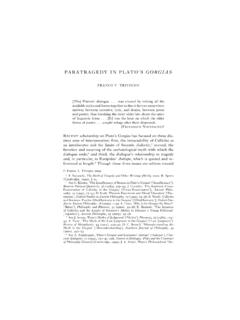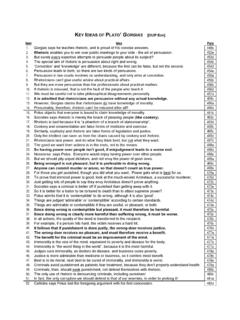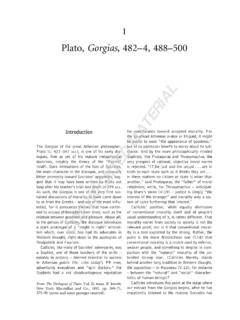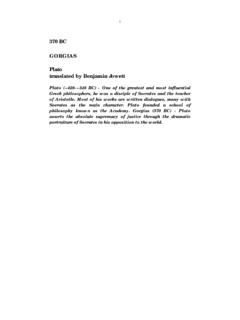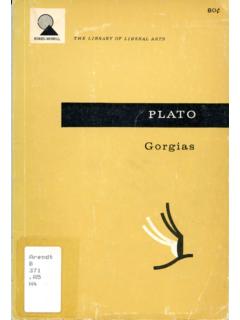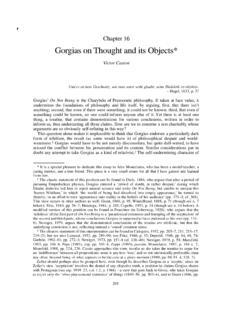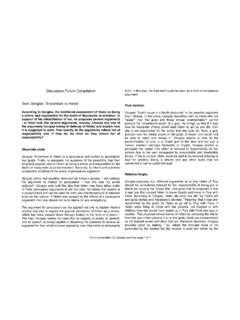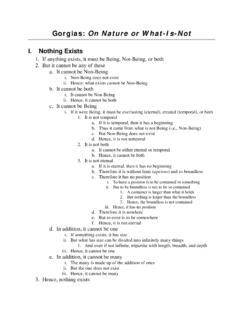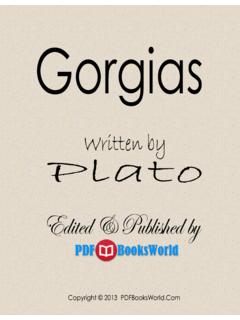Transcription of GORGIAS’ DEFENSE: PLATO AND HIS OPPONENTS ON RHETORIC AND ...
1 gorgias DEFENSE: PLATO AND HIS OPPONENTS ONRHETORIC AND THE GOODR achelBarneyabstract:This paper explores in detail gorgias defense of RHETORIC in PLATO sGorgias(456c 7c), noting its connections to earlier and later texts such as Aristophanes Clouds, gorgias Helen, Isocrates NicoclesandAntidosis, and Aristotle sRhetoric. The defense asPlato presents it is transparently inadequate; it reveals a deep inconsistency in gorgias conception of RHETORIC and functions as a satirical precursor to his refutation bySocrates. Yet gorgias defense is appropriated, in a streamlined form, by later defend-ers of RHETORIC such as Isocrates and Aristotle. They present it as an effectivereductioagainst a critique of RHETORIC that depends on the harm criterion.
2 This is puzzling,since PLATO s own critique of RHETORIC doesnotdepend on the harm criterion. Onthe other hand, Platodoesseem to embrace the harm criterion as a more generalprinciple as if pre-emptively embracing thereductio in his arguments about thegood in theMenoandEuthydemus. Nonetheless, Isocrates and Aristotle seem to bedeliberately misreading PLATO on RHETORIC : where he intends to criticize its intrinsicnature, they respond as if he were merely complaining about its contingent is not unknown for readers of PLATO to see amodus tollenswhere he apparentlyintended amodus ponens, or vice versa, and to side with his characters againsttheir in theGorgiashas had his defenders, most notoriouslyRachel Barney is Canada Research Chair in Classical Philosophy at the University of has previously taught at the University of Chicago, Harvard University, the University ofOttawa, and McGill University.
3 In addition toNames and Nature in PLATO sCratylus (Routledge,2001), she is author of numerous articles on ancient philosophy, including Eros and Necessityin the Ascent from the Cave, Ancient Philosophy(2008); Aristotle s Argument for a HumanFunction, Oxford Studies in Ancient Philosophy(2008); The Carpenter and the Good, inPursuingthe Good: Ethics and Metaphysics in PLATO s Republic, ed. Cairns, Herrmann, Penner (University ofEdinburgh Press, 2008); and The Sophistic Movement, inA Companion to Ancient Philosophy, and Pellegrin (Blackwell, 2006).1 For an extended attempt to champion PLATO s characters against their author, see ,Cross-Examining Socrates: A Defence of the Interlocutors in PLATO s Early Dialogues(Cambridge:Cambridge University Press, 2000).
4 Of course, how we cantellwhat PLATO intended is anenormously difficult question, and we need to be alive to the possibility that Socrates may notThe Southern Journal of PhilosophyVolume 48, Issue 1 March 2010 The Southern Journal of Philosophy, Volume 48, Issue 1 (2010), 95 0038-4283, online ISSN 2041-6962. DOI: is less well known that some important ancient readers took theside of Socrates first opponent in the same dialogue, gorgias himself, in adebate about the nature and value of purpose in this paper is tooffer a reading of gorgias defense of RHETORIC and its relation to PLATO s owncritique. I will then trace some of the dialectical story to which the defensebelongs, and show how it may have contributed to a broader ancient debateabout the good gorgias DEFENSEThe passage that I will call gorgias Defense runs as follows (bracketedletters are my own, for ease of reference):4[A] One should, however, use RHETORIC like any other competitive skill, other cases, too, one ought not to use a competitive skill against any andeverybody, just because he has learned boxing, or pancration, or fighting inarmor, so as to make himself be superior to his friends as well as to his s no reason to strike, stab, or kill one s own friends!
5 Imagine someone whoafter attending wrestling school, getting his body into good shape and becoming aboxer, went on to strike his father and mother or any other family member orfriend. By Zeus, that s no reason to hate physical trainers and people who teachfighting in armor, and to exile them from their cities! [B] For these peopleimparted their skills to be used justly against enemies and wrongdoers, and indefence, not aggression, but their pupils pervert their strength and skill and usethem incorrectly. So it s not their teachers who are wicked, nor does that make thecraft guilty and wicked; those who use it incorrectly are, I think, the wicked ones.[C] And the same is true for RHETORIC as well.
6 [D]The rhetorician has the abilityto speak against everyone on every subject, so as in gatherings to be more per-suasive about, in a word, anything he likes, but the fact that he has the ability tobe presented as having a monopoly on the truth. Cf. J. M. Cooper, Socrates and PLATO inPlato sGorgias, inReason and Emotion, 29 75 (Princeton: Princeton University Press, 1999).2 See E. R. Dodds, Appendix: Socrates, Callicles, and Nietzsche, inPlato: gorgias , ed.,intro., and commentary by E. R. Dodds (Oxford: Oxford University Press, 1959), 387 is despite the fact that the connections among the texts I discuss have long beenrecognized. Cope cites theAntidosisand theGorgiasin reference to theRhetoric(E.)
7 M. Cope, ed.,The RHETORIC of Aristotle, rev. J. E. Sandys, 3 vols. [Cambridge: Cambridge University Press, 1877],1: 24n13). S. Sudhaus ( Zur Zeitbestimmung des Euthydem, des gorgias und der Republik, Rheinisches Museum44 [1889]: 52 64) notes the connections among theGorgias,Nicocles, andAntidosispassages (63 64).4 Here and throughout, except where specified, I use gorgias to refer to the character inPlato s dialogue. The substantive views of the historical gorgias are difficult to pin down,though theHelencertainly articulates something like the manipulative conception of RHETORIC :whether gorgias Defense represents anything the historical gorgias said (or could have said) isan unanswerable question.
8 For a sophisticated account of theGorgias(and later Isocratean andAristotelian thinking about RHETORIC ) as responses to authentically Gorgianic problems andideas, see Robert Wardy,The Birth of RHETORIC : gorgias , PLATO , and Their Successors(London: Rout-ledge, 1996).96 RACHEL BARNEYrob doctors or other craftsmen of their reputations doesn t give him any more ofa reason to do it. He should use RHETORIC justly, as he would any competitive I suppose that if a person who has become a rhetorician goes on with thispower and this skill to commit injustice, we shouldn t hate his teacher and exilehim from our cities. For while the teacher imparted it to be used justly, the pupilis making the opposite use of it.
9 So it s the one who uses it incorrectly whom it sjust to hate and exile or put to death, not the tone of protestation here signals that we are dealing with a counter-argument aDefenseagainst anImputed Objection. But no such objection pre-cedes it in our text. On the contrary, gorgias himself has been speaking for awhile, and speaking inpraiseof RHETORIC . In the earlier part of his speech(456a7 c7), which I will discuss later as theAdvertisement, he has been enlargingon the enormous powers given by RHETORIC to its possessors, including the powerto supplant and enslave the practitioners of all the other crafts. So gorgias protestations here must be responding to some objection that this Advertise-ment is expected to prompt.
10 Reading backwards, the Objection is apparentlythat RHETORIC is harmful and dangerous inasmuch as it facilitates injustice andaggression, and that teaching RHETORIC is therefore morally Imputed Objection(IO): The teacher of RHETORIC is morally blameworthy,since he transmits a power that can be (ab)used is a frustrating haziness surrounding the Imputed Objection. Surely itmust matter to the critic howoftenrhetoric is used to do injustice, and how itsharmful effects compare to its beneficial ones. What general principle aboutthe connection between the facilitation of injustice and blameworthiness isbeing relied on here? And how are injustice and the abuse (or incorrect use)of RHETORIC related to each other? But of course it is not in gorgias interest tosupply a clear and cogent position to his critics; here, as in the later defensesof RHETORIC I will consider, the Imputed Objection is only ever glimpsedthrough the palisades of the Defense.


